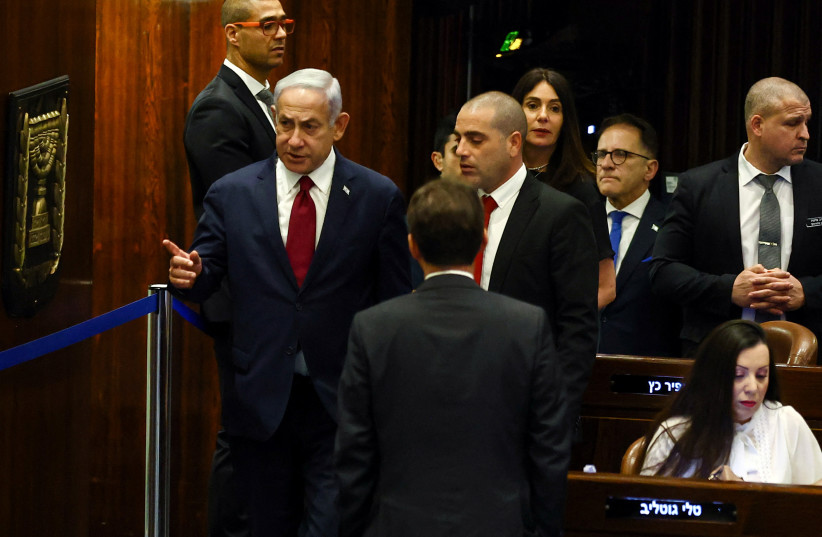Lapid and Gantz, restart Israeli judicial reform talks – editorial
Prime Minister Benjamin Netanyahu did the right thing in late March when – as the situation inside Israel seemed to be spiraling out of control amid massive protests, reservists threatening not to show up for reserve duty, and a plummeting shekel – he paused the judicial reform legislation and entered into negotiations with opposition parties in search of a compromise.
Netanyahu was blasted for this move by the extremists on both sides.
On the left, he was slammed for not freezing the plan completely and forever – as if he had not just won the election, as if there were absolutely nothing to reform in the judiciary.
And on the right, he was lambasted for agreeing to any pause in the legislation, as diehards inside the coalition were convinced that their November election victory gave them license to ram the reform through the Knesset as fast as possible.
By pausing the legislative process, Netanyahu signaled a realization that winning the judicial reform battle, but losing solidarity and cohesion within the nation along the way, was a price too high and one not worth paying.As a result, the two sides have been negotiating for weeks under President Isaac Herzog’s auspices in search of some common ground. Until now, that is.
 Prime Minister Benjamin Netanyahu gestures before he casts his vote as the Knesset elects its two members to the Judicial Selection Committee on June 14, 2023 (credit: RONEN ZVULUN/REUTERS)
Prime Minister Benjamin Netanyahu gestures before he casts his vote as the Knesset elects its two members to the Judicial Selection Committee on June 14, 2023 (credit: RONEN ZVULUN/REUTERS)On Wednesday, opposition leader Yair Lapid and National Unity party head Benny Gantz announced that they were freezing the talks.
Oddly, the announcement came after they just won a political victory in the Knesset: opposition MK Karine Elharrar secured a seat on the powerful nine-person Judicial Selection Committee.
Lapid and Gantz prevented the coalition from doing what many in the government had favored: appointing two coalition MKs to the committee instead of one each from the coalition and the opposition as has traditionally been done. This could have far-reaching ramifications regarding the selection of Esther Hayut’s replacement as Supreme Court chief justice when she retires in a few months.
Elharrar won because at least four coalition MKs defied coalition discipline and voted for her in secret balloting. The coalition’s candidate, Tally Gotliv–not supported by Netanyahu – was soundly defeated in her bid. As a result, another vote will be held in 30 days to determine the coalition’s representative. In the meantime, the committee won’t meet and no new judicial appointments will be made.
And how did Gantz and Lapid celebrate their victory at the end of this day of high political drama? They froze the negotiations.
Why do that, since they succeeded in getting their delegate appointed to the committee?
Because Netanyahu can’t be trusted, they said. Because Netanyahu gave a commitment that the judicial panel would be established immediately, but it can’t be convened now for another month until a coalition representative is appointed. Therefore, the negotiations will be frozen until the committee is up and running.
Who are Gantz and Lapid trying to punish with talk freeze?
It is unclear who Gantz and Lapid are trying to punish with this move.
If it is Netanyahu, then they must surely know that the prime minister, with his parliamentary majority, could once again unilaterally begin pushing the judicial reform legislation through the Knesset.
No, freezing the talks now doesn’t punish Netanyahu. It does, however, punish the public.
How so? Because the majority of the country, as polls consistently show, wants to see the sides reach a compromise.
The majority of the country does not want to see a return to the days of IAF reserve pilots threatening not to show up for reserve duty; “Days of Disruption” blocking roads; calls for a general strike; concern about hi-tech money streaming out of the country; external enemies seeking to take advantage of what they misperceive as the country’s collapse from within; talk of civil war.
The majority of the country wants the sides to reach a compromise on judicial reform so Israel can move on and so the government can focus on such minor matters as the looming Iranian threat, spiraling violence in the Arab sector, and the high cost of living. Freezing the talks now moves the country further away from that goal, not closer to it.
Lapid and Gantz should reconsider. They won a small victory on Wednesday. Now they should display some magnanimity in this victory and let the judicial reform talks recommence at once. That would be acting for the good of the country.





Comments are closed.